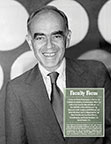Introducing Alina Das ’05
Assistant Professor of Clinical Law
Printer Friendly VersionAs students in the Immigrant Rights Clinic, Alina Das and her friends would joke about making those years last forever, perhaps by forming a law firm to fight for immigrants’ rights. “Of course, we all knew that we’d go our separate ways, but we fantasized about what an ideal job it would be,” she says.
Returning to the IRC first as a teaching fellow in 2008, then joining the faculty in May 2011, she has come close to realizing her dream. “To actually have this be my professional home for the foreseeable future is really exciting,” says Das.
Petite, unassuming, and reserved, Das is nonetheless “a tenacious advocate, focused and completely attuned to what really matters to immigration judges,” says her mentor and fellow IRC instructor, Professor of Clinical Law Nancy Morawetz ’81. Her students concur. “What stands out is her boisterous laugh and genuine joy when we’re doing well for our clients,” says Stephen Kang ’11. “She encourages us to always keep our clients front and center.”
Coming from an immigrant background that often made her feel an “overwhelming otherness,” Das has a personal connection to her specialization at the intersection of immigration and criminal law. With the passage of the Illegal Immigration Reform and Immigrant Responsibility Act of 1996, “all the rights that we assume apply to everyone—a day in court, a judge’s discretion—get tossed out the window once the defendant is labeled an immigrant and a criminal,” she says.
In “The Immigration Penalties of Criminal Convictions: Resurrecting Categorical Analysis in Immigration Law” (New York University Law Review, forthcoming), Das notes that convictions once triggered a categorical immigration penalty based on the statutory definition of the offense. Today’s courts increasingly permit inquiry into the adverse facts of the crime. She argues for the traditional approach.
In “Immigrants and Problem-Solving Courts” (Criminal Justice Review, 2008), Das examined the unintended consequences that incarceration alternatives have on immigrants. Typically, a defendant pleads guilty up front to lessen or erase the offense if he successfully completes a treatment program. But under federal immigration law, officials assert that the plea, coupled with a restraint on one’s liberty (albeit a volunteer program), is grounds for deportation.
Joanne Macri, director of the Criminal Defense Immigration Project at the New York State Defenders Association (NYSDA), says Das’s work helped bring about a provision in the Rockefeller Drug Law Reform to waive the up-front guilty plea when it can result in severe consequences such as deportation. Similarly, another brief Das co-authored was cited in Jean-Louis v. Attorney General of the United States, which ruled in favor of categorical analysis. “It’s amazing to see what she’s accomplished in such a short time,” says Macri. “I can’t wait to see what she’s going to do next.”
Das and her brother, Shamik, grew up in Baton Rouge, Louisiana, with dad, Dilip, and mom, Mala, who encouraged Das to focus on her education. “I was a nerdy, focused student who joined the math club, went to science fairs, and threw myself into learning,” she recalls.
As an undergraduate at Harvard University, she spent one summer at an NGO in Bangladesh working on women’s issues, and another in Mozambique studying democratization. After graduating magna cum laude in 2001 with an A.B. in government, she entered NYU Law on a Root-Tilden-Kern Public Interest Scholarship and continued to explore a variety of interests, taking internships in mental health, racial discrimination, housing, community health, and employment discrimination. She graduated with a J.D. and a master’s of public administration.
After clerking for the Honorable Kermit Lipez of the U.S. Court of Appeals for the First Circuit, she was a Soros Justice Fellow and staff attorney for the NYSDA Immigrant Defense Project.
Das spends her spare time with her fiancé, Nafees Tejani, and a close group of friends. Given her intense focus, it’s understandable that she might need time to learn how to adjust her tempo and relax sometimes. “I’ve worked hard to carve out a space where I can get outside of my head,” she says, “and just enjoy being in this really great place.”
—


 Multimedia
Multimedia